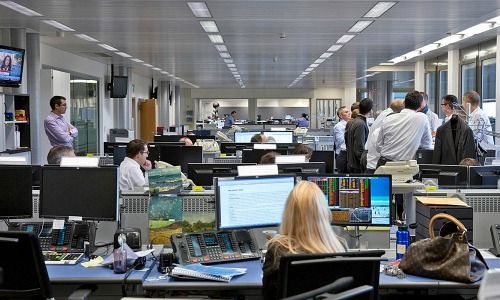Andreas Vetsch: «Will Securities Traders Soon Be Redundant?»
Algorithm-based deep learning methods are increasingly being used in securities trading. Sooner or later, they are likely to replace humans, Andreas Vetsch writes.
By Andreas Vetsch, a hedge fund analyst at LGT
 Machine learning is a subset of artificial intelligence. The term is used very broadly and refers to technologies that identify patterns in big data sets. Algorithms are used in order to try and discover commonalities that the human brain cannot recognize. The systems learn from their experience and constantly evolve. They are designed to interlink data intelligently, recognize relationships and make predictions on the basis thereof.
Machine learning is a subset of artificial intelligence. The term is used very broadly and refers to technologies that identify patterns in big data sets. Algorithms are used in order to try and discover commonalities that the human brain cannot recognize. The systems learn from their experience and constantly evolve. They are designed to interlink data intelligently, recognize relationships and make predictions on the basis thereof.
The high volume of data, long historical records and quantitative nature of financial markets make them ideal for machine learning applications.
Modeled After the Human Brain
Deep learning technologies based on complex neural networks are increasingly being used in this area. The functioning of neural networks is modeled on the human brain. Neurons are an important component of the brain.
These nerve cells have extensions that transmit information from one cell body to the next and establish or break down connections. In the neural network, this function is performed in the hidden layers. These are responsible for the assessment of cause-and-effect relationships and calculate probability. A neural network is constantly evolving because it takes into account past experience and makes corresponding adjustments.
The Right Conclusions
Systems based on neural networks are used, for example, in image and word recognition, but also in the development of trading strategies. Just as they recognize certain features in a photo, they can also analyze the market environment.
By analyzing historical data, these systems know how the market reacted to past events and learn to draw the right conclusions even in the most diverse range of market conditions.
Forecasting Share Prices
The objective behind such an automated trading system could, for example, be to predict future share prices based on the market movements that took place just several hours previously. The challenge here is to define the relevant input data and the suitable algorithms needed to train the system. As part of this process, it is important to minimize errors and improve performance.
The latter is measured according to how well the system predicts the market’s direction. Ideally, it should do so better than traditional methods or a human trader and should constantly evolve.
The Complexity of Financial Markets
However, developing a trading system based on machine learning is very challenging. In financial markets, time series have a low signal-to-noise ratio, which means that there is a great deal of irrelevant information in addition to relevant information. This makes it more difficult for the algorithm to make the right decision.
The reason for this is the complexity of financial markets, where a large number of factors influence each other. These factors are the result of the individual actions of countless market participants.
The Future of Trading
Furthermore, deep learning algorithms offer only limited transparency when it comes to their decision-making. It is almost impossible to understand how trading decisions are made by the system. To a certain extent, the user has to trust the system blindly. And last but not least, when a large amount of data is handled, it can be misleading because an algorithm will always find a pattern, even if there is none.
Notwithstanding, such systems are likely to represent the future of securities trading because the constant rise in computing power paired with ever more comprehensive data sets provide an excellent basis for profitable trading strategies.
Machine learning makes it possible to work with non-linear data and identify patterns through complex interactions, also in cases that would be too complex for humans. That is why the trend toward machine trading is set to continue over the coming years and the human factor will further diminish.
Andreas Vetsch is a hedge fund analyst at LGT and specializes in trading strategies. Before joining the group in 2012, he studied at the University of St. Gallen, where he received a master’s in banking and finance and a degree in business journalism.











